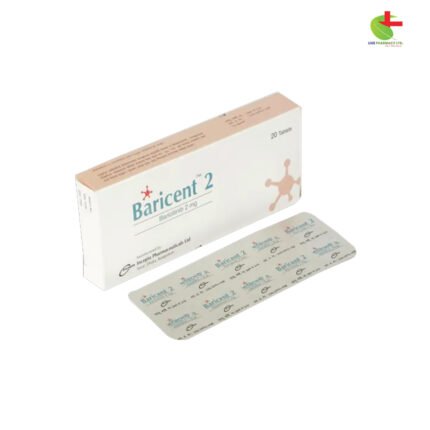Baricent 4
280.00৳ Strip
- Baricent is used for adults with moderate to severe rheumatoid arthritis who have not responded to TNF antagonist therapies.
- It selectively inhibits JAK1 and JAK2 enzymes, reducing inflammation and immune response.
- The recommended dosage is 2 mg daily, either as monotherapy or with DMARDs.
- Caution is required for patients with renal or hepatic impairment.
Indications
Baricent is prescribed for the treatment of moderate to severely active rheumatoid arthritis in adult patients who have not responded adequately to one or more tumor necrosis factor (TNF) antagonists.
Important Limitation: Baricent should not be used in combination with other JAK inhibitors, biologic DMARDs, or potent immunosuppressants like Azathioprine and Cyclosporine.
Pharmacology
Baricitinib is a selective Janus kinase (JAK) inhibitor targeting JAK1 and JAK2. JAK enzymes play a key role in cytokine and growth factor signal transduction, influencing immune function, inflammation, and hematopoiesis. By partially inhibiting JAK1 and JAK2, Baricitinib reduces STAT (signal transducers and activators of transcription) activation, thereby modulating gene expression that regulates immune responses and inflammation.
Dosage & Administration
- Recommended Dose: The typical dose for adults is 2 mg once daily, either alone or in combination with Methotrexate or other DMARDs. Baricitinib can be taken with or without food.
- Pediatric Use: The safety and effectiveness of Baricitinib have not been established for pediatric patients.
- Geriatric Use: Elderly patients may have reduced renal function. Dose adjustments should be made with caution.
- Renal Impairment: Not recommended for patients with an estimated GFR of less than 60 mL/min/1.73 m².
- Hepatic Impairment: No dose adjustments are needed for patients with mild to moderate hepatic impairment.
Drug Interactions
- OAT3 Inhibitors: Co-administration with strong OAT3 inhibitors (e.g., Probenecid) may increase Baricitinib levels.
- Other JAK Inhibitors or Biologics: Baricent has not been studied in combination with other JAK inhibitors or biologic DMARDs.
Contraindications
- Anemia: Avoid use if hemoglobin is below 8 g/dL.
- Lymphopenia & Neutropenia: Do not initiate or interrupt treatment if Absolute Lymphocyte Count is below 500 cells/mm³ or Absolute Neutrophil Count is below 1000 cells/mm³.
Side Effects
Common side effects include:
- Increased LDL cholesterol (33.6%)
- Upper respiratory tract infections (14.7%)
- Nausea (2.8%) Other adverse reactions are generally mild to moderate.
Pregnancy & Lactation
Baricitinib is contraindicated during pregnancy and should not be used while breastfeeding due to the unknown effects on human milk.
Precautions & Warnings
- Serious Infections: Avoid Baricent in patients with active, serious infections, including localized infections.
- Tuberculosis (TB): Baricent should not be used in active TB cases.
- Cancer Risk: Carefully evaluate the risks and benefits for patients with existing malignancies (except successfully treated non-melanoma skin cancers).
- Thrombosis & GI Perforations: Caution is advised in patients with a higher risk of thrombosis or gastrointestinal perforations.
Overdose Effects
Overdose may cause adverse reactions similar to the drug’s known effects, such as nausea or gastrointestinal symptoms. Symptomatic treatment should be initiated if necessary.
Therapeutic Class
Immunosuppressant
Storage Conditions
Store at or below 30°C, in a cool, dry place. Keep away from moisture and direct sunlight. Ensure the product is kept out of reach of children.












Reviews
There are no reviews yet.